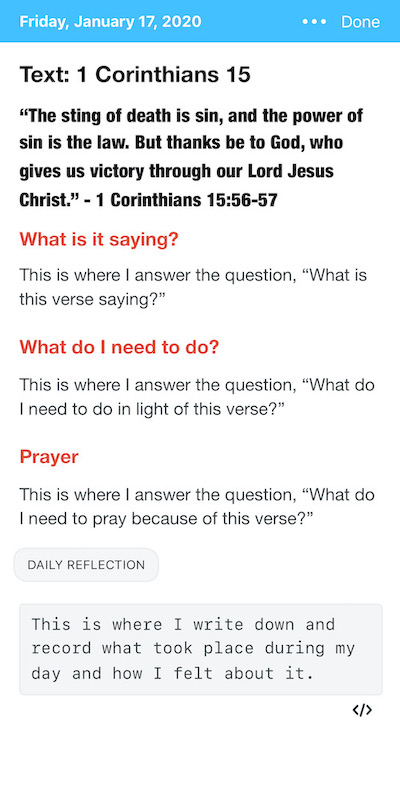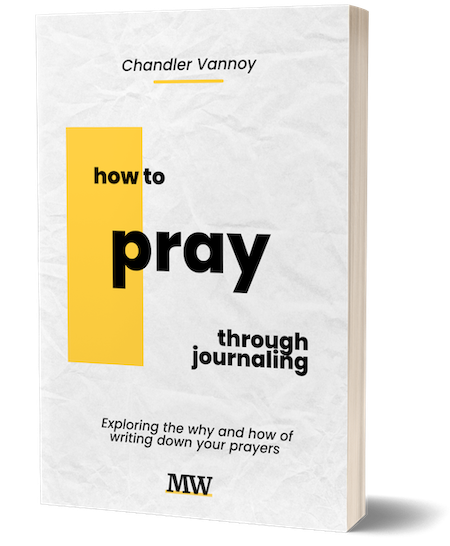
In our culture, personal self-improvement continues to be a hot topic. Market research states that the total U.S. self-improvement market was worth $9.9 billion in 2016, and it has only grown since then.
If you Google self-improvement, many of the articles you will read suggest some type of journaling. These journals are focused on helping you increase your gratitude, forming healthy eating habits, or even becoming a morning person.
None of these topics are bad in and of themselves, but the type of journaling I want to encourage is focused on helping you spend meaningful time with God.
Instead of reading Scripture to check it off of our to-do lists, journaling slows us down to reflect on what we read and engage with God through prayer. If you want to read more about why journaling is helpful to our relationship with God, you can check out this post here.
Even if you here about all the reasons why journaling, you may still be intimidated by it. I know I was. The first time someone shared the idea of journaling with me, I had no clue where to start. This was because it was an abstract concept for me.
This is true anytime we attempt to start something we have never done before. Even when we know something is good for us, we need help getting started. Just think about working out. If we were to show up to the gym without a workout plan, we would not know where to begin. On the other hand, when we come prepared with a workout plan though, it gives us a clear process to follow and instructions for each exercise.
That’s exactly what I want to share with you. I want to give you a plan to help you begin journaling. But even though we are going to walk through a plan, we must remember that a habit of journaling can be whatever we want it to be. There are no rules that you must abide by. Your daily journal can be as long or as short as you want. The goal isn’t to be perfect. It is to be consistent.
So here are 3 steps to help you actually start journaling this year:
1. Choose your journal format.
This may seem extremely basic, but we have to start here. If you don’t know where you are going to be journaling, you are never going to start.
So first, decide if you would like to journal using paper or technology. If you normally write everything down using pen and paper, then paper is probably the right choice for you. If you are like me and hardly ever carry a pen, it will probably be best to use technology for your journal.
For those who desire to use pen and paper, there are many options to choose from. You can use a typical spiral notebook, a Moleskine notebook, a Baron Fig notebook, or you can look into a customized journal with prompts. As you can tell, there are a lot of options out there, so do a little research and then choose the one that fits you best.
For those who would rather use technology to journal digitally, there are just as many options. I will say that I have tried many apps and my clear favorite is the Day One journal app on my iPhone. But that might not be the best fit for you, so here are a few other options. You can use the Notes app on your phone or computer, Evernote, Penzu, Journey, and of course, the classic, Microsoft Word. Once again, do a little bit of research, choose one, and stick with it.
2. Choose a template to follow.
After you choose your format, it is time to decide what you are going to write down each day. For me, the easiest way to consistently journal is to follow the same template most days. Of course, this will change from time to time, but when I have a plan to follow, it is much easier. Here are three prompts that you can use to get started.
Write out your prayers
Write down what you normally pray. This allows you to visualize your prayers. It also keeps you focused. Often times when we spend time with God, we will pray the same old things in the same old ways. Writing down our prayers gives us a visualization of what is taking place in our hearts. This is exactly what King David did, and when we read the Psalms, we are reading through his prayer journals. So if you go this route, you are in good company.
Write out reflections from Bible reading
As mentioned before, it is easy to read Scripture to simply check it off our to-do list and miss out on thinking deeply about God. When we spend time writing out and reflecting on Scripture, it allows us not only to read the Word, but it also allows the Word to read us.
In order to reflect on what you read, here’s a quick format to follow.
Choose a word, verse, or phrase and write it down in your journal.
Then after you write it down, answer these 3 questions in reflection:
- What is this verse saying?
- What do I need to do in light of this verse?
- What do I need to pray because of this verse?
Once again, don’t feel like you have to write long paragraphs of reflection each day. The point of reflecting is to interact with what we read and let it impact the way we live.
Write out what happened in your day
It is common for us to go through our day without spending the time to process what actually took place. When we spend time writing down the events of our day, it allows us to debrief our thoughts and feelings. It also gives us a record to look back on and see how God has been working in our life. So for this, simply write down and record what took place during your day and how you felt about it. When you look back over the months and years, you’ll be amazed at God’s faithfulness.
Here is an example of the journal template I use in Day One:
 3. Choose a time and schedule it into your day.
3. Choose a time and schedule it into your day.
As I shared in this post about Habits and New Year’s Resolutions, research shows that 90% of us are going to fail to reach our goals this year.
So, that’s the bad news. But the good news is we control one of the biggest factors that go into that stat:
Our calendar.
We all know that if we are not careful, our calendar can control us instead of us controlling our calendar.
So when it comes to journaling, we need to choose a time during the day that we will dedicate to getting away and spending time with God. Then, we need to place it on our calendar. And finally, we need to protect that time.
For me, this is normally in the morning before I go to work. Of course, life happens to where that is not always the case, so I then try to schedule it for later in the day.
Once we begin to schedule the time and make it a habit, it will become routine to carve out the time in our day.
I hope these 3 steps are helpful to you and give you a plan to start journaling. If you want to make journaling a habit, remember that the goal isn’t to be perfect. The goal is to simply spend meaningful time with Jesus.
Maybe you’ve been journaling for a while and have some great tips to share as well. I’d love to hear them! Leave a comment below about how you journal and what has been helpful to you.




